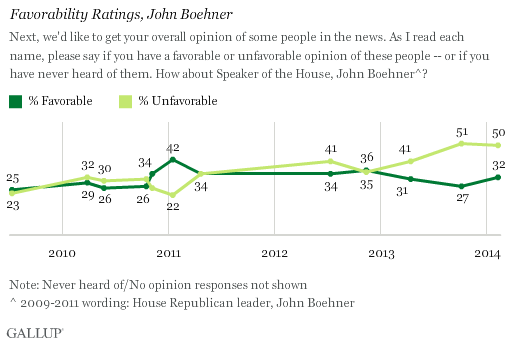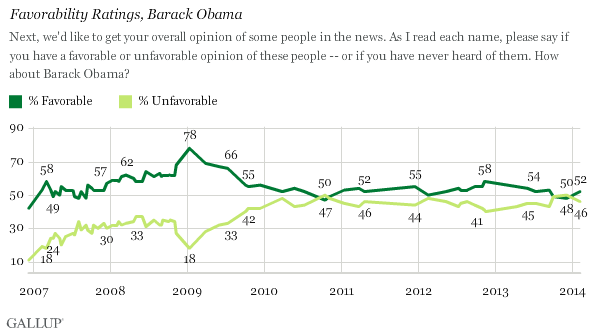WASHINGTON, D.C. -- After suffering record-low favorability for his tenure as House speaker in October, John Boehner's image among Americans has rebounded to pre-shutdown levels. Still, Boehner, who on Tuesday attended his first private meeting with President Barack Obama since late 2012, continues to be viewed more unfavorably (50%) than favorably (32%).

The latest results are from a Feb. 6-9 Gallup poll. Gallup first asked Americans about Boehner's image in 2009, when a quarter (25%) viewed him favorably and 23% viewed him unfavorably, with the rest, 52%, having never heard of him or having no opinion. Over the years, Americans have generally viewed Boehner more unfavorably than favorably, except in January 2011 -- when he took the speaker's gavel after Republicans won control of the House of Representatives -- and again in November 2012, when Americans were more favorable than unfavorable by one percentage point.
For Boehner, 2014 could be a turning of the page as he recovers from the October federal government shutdown, which resulted in his party's receiving the lowest party favorability ratings ever recorded by Gallup, and a drop in his own image to 27% favorable and 51% unfavorable. His favorability has now edged back up to where it was in April of last year (31%), and he recently allowed a vote on the debt ceiling increase with no attached legislation -- a move Boehner had never previously made as speaker. Boehner had set the tone for 2013 by telling his party in January of that year that he was done negotiating with the president one-on-one, and hadn't met with him since December 2012.
New Year, New Favorability Ratings, New Relationship
As Obama and Boehner met in the Oval Office Tuesday, the president clearly had the upper hand in terms of image. Like Boehner's favorability ratings, the president's ratings took a dip in late 2013 and have begun to recover this year. But unlike Boehner's, Obama's ratings have tended to be much more positive than negative over the years since he first ran for the presidency, though well below those from his initial year as president and his personal high after he won the 2008 election. In the February survey, Obama's favorable vs. unfavorable ratings were 52% to 46%.

The president and the speaker have consistently sparred on a variety of fiscal issues since Boehner became speaker, and the two hadn't met privately since their unsuccessful attempt at a bargain as the "fiscal cliff" loomed in 2012. Last year's political drama didn't improve their relationship by any means, and culminated in October's government shutdown, leaving Obama with his second-lowest favorability rating since taking office in 2009. With both of their favorability ratings on the rise since the shutdown, 2014 could serve as a restart for Boehner and Obama.
Bottom Line
Boehner and Obama's relationship has likely never been more ready for negotiating, as both reconnect after a hard year of gridlock. But while the stalemate over raising the debt ceiling has let up, other disagreements such as immigration might not be overcome.
Ultimately, 2013 wasn't just a bad year for the speaker and the president; it was also a bad year for Americans, who watched their government partially halt for 16 days, sending their confidence in the economy downward and convincing them that government itself was the nation's biggest problem.
At this point, Americans see Obama in a much more favorable light than they see Boehner, giving the president considerable power in the court of public opinion as the two leaders joust on a series of issues and policy proposals facing the country. This has been typical of president-speaker relationships, with presidents commanding much higher favorability from the nation that elected them to the job. Boehner is no exception to this, and lower favorability usually comes with his role in the political process.
Survey Methods
Results for this Gallup poll are based on telephone interviews conducted Feb. 6-9, 2014, on the Gallup Daily tracking survey, with a random sample of 1,023 adults, aged 18 and older, living in all 50 U.S. states and the District of Columbia.
For results based on the total sample of national adults, the margin of sampling error is ±4 percentage points at the 95% confidence level.
Interviews are conducted with respondents on landline telephones and cellular phones, with interviews conducted in Spanish for respondents who are primarily Spanish-speaking. Each sample of national adults includes a minimum quota of 50% cellphone respondents and 50% landline respondents, with additional minimum quotas by time zone within region. Landline and cellular telephone numbers are selected using random-digit-dial methods. Landline respondents are chosen at random within each household on the basis of which member had the most recent birthday.
Samples are weighted to correct for unequal selection probability, nonresponse, and double coverage of landline and cell users in the two sampling frames. They are also weighted to match the national demographics of gender, age, race, Hispanic ethnicity, education, region, population density, and phone status (cellphone only/landline only/both, and cellphone mostly). Demographic weighting targets are based on the most recent Current Population Survey figures for the aged 18 and older U.S. population. Phone status targets are based on the most recent National Health Interview Survey. Population density targets are based on the most recent U.S. census. All reported margins of sampling error include the computed design effects for weighting.
In addition to sampling error, question wording and practical difficulties in conducting surveys can introduce error or bias into the findings of public opinion polls.
View survey methodology, complete question responses, and trends.
For more details on Gallup's polling methodology, visit www.gallup.com.
